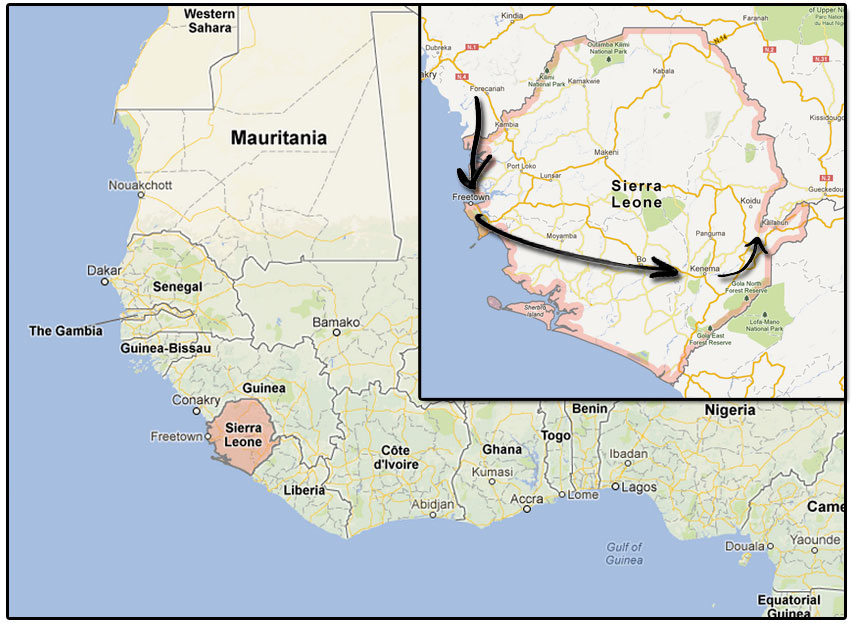Kusheh! (That’s “hello” in Krio!)
Team Sierra Leone is heading out over the Atlantic to Sierra Leone on Sunday! Sierra Leone is located in northwest Africa between Guinea and Liberia. The whole team of six (plus our faculty sponsor, Susan StVille), will begin in Freetown, Sierra Leone’s capital, and then head east to Kenema and Kailahun for five days to interview health staff and other stakeholders in maternal and child health. Then half of the group is going to stay east for a couple of days to do some site visits in Bo while the rest of the group will head back to Freetown to talk with the Sierra Leone government and NGOs. At that time, Professor Emily Block will be joining up with us too!
Project Background
This is Business on the Front Lines’ first project in Sierra Leone and also the first time the course is working with healthcare. Our team will be working with Catholic Relief Services (CRS) to find a way to merge the traditionally-trained birth attendants (TBAs) with the formal healthcare system in order to reduce maternal and infant mortality rates. One possible solution would be to have TBAs become community health workers (CHWs), which are aligned with the government healthcare system, but the problems here are two-fold: CHWs are unpaid volunteers; and becoming a CHW means that there will be many more responsibilities in addition to assisting with births.
Our job, in this case, involves creating an incentive strategy for TBAs to become CHWs – what needs to be done in order for TBAs to move to this formal healthcare role so they can provide more comprehensive services and assist pregnant women, new mothers, and their young children with proper medical care?
Fortunately, there has been significant support for maternal and child healthcare from the Sierra Leone government in the past few years. The Free Healthcare Initiative (FHC-I) was enacted in April 2010 which provides all pregnant and lactating women and children under 5 years old free healthcare. The sustainability of this program is in question, though, as it is largely funded by donors. The encroaching 2015 deadline of the Millennium Development Goals is another concern, as Sierra Leone tries to address MDGs #4 and #5 in reducing maternal and infant mortality rates. (Sierra Leone currently has the third highest rates in the world.) The new Minister of Health and Sanitation, Miatta Kargbo, provides a ray of hope in her initiatives to solve some of the core problems with the high mortality rates such as curable complications, teenage pregnancy, and women’s rights.
CRS has been in Sierra Leone since 1963 and has supported Sierra Leone throughout its brutal civil war (1991-2002) and on the post-conflict stage. In regards to maternal and child health and our project in particular, CRS has a program called Quality Circles that acts as a means for open dialogue and counseling between TBAs and the formal healthcare system. We are going to be fortunate enough to be able to speak with CRS employees and TBAs that are members of Quality Circles during our time in-country.
Beyond Work
Outside of work, we are going to have some free time in Kenema and are hoping to explore the beautiful beaches around Freetown. We are also going to visit to the Tacugama chimpanzee sanctuary!
We are all honored to be a part of this class and project. We hope to put our best foot forward to serve alongside CRS in making Sierra Leone a better place for women and children to live healthier, happier lives.
